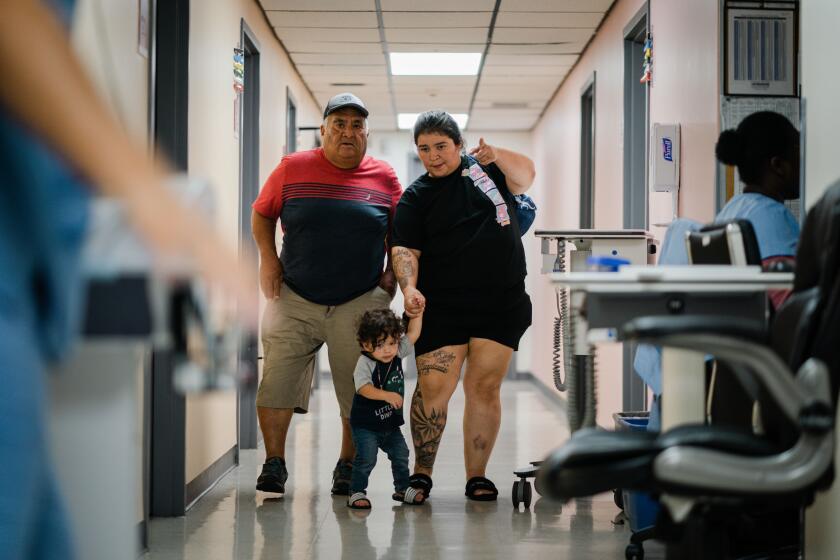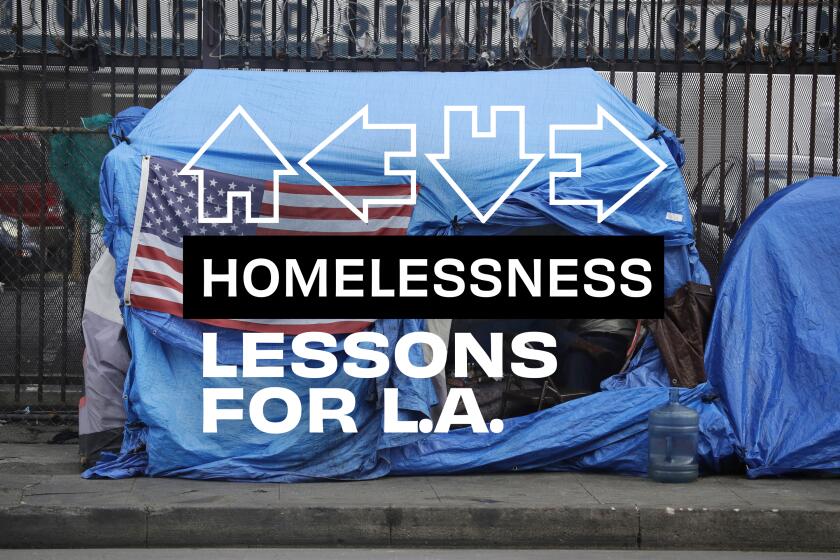Trump says he will never stop trying to repeal Obamacare. California would feel the biggest impact

- Share via
WASHINGTON — As he campaigns for a return to the White House, former President Trump vowed recently to “never give up” his call to repeal Obamacare, also known as the Affordable Care Act. Trump and congressional Republicans came within one vote of repealing the law during his first term — a defeat that he ranks as one of his biggest disappointments.
California, where about 6.6 million people enrolled in insurance because of the law, would be hit particularly hard by a repeal.
“In terms of raw numbers, no state has more at stake from a potential repeal of the ACA as California,” said Larry Levitt, executive vice president for health policy at KFF, formerly Kaiser Family Foundation.
What did Trump say he would do?
Trump wrote on his social media platform on Christmas that the ACA is “too expensive, and otherwise, not good healthcare,” while promising to come up with “a much better, and less expensive, alternative!”
“We had a couple of Republican Senators who campaigned for 6 years against it, and then raised their hands not to terminate it,” Trump wrote in November. “It was a low point for the Republican Party, but we should never give up!”
Trump has promised to outline a replacement plan since his 2016 campaign but has not done so.
Republicans, after campaigning on the promise to repeal the law for years, came close in 2017 but fell short when Sen. John McCain, the Arizona Republican who had terminal brain cancer, gave a dramatic thumbs down to the party’s proposal, which was also opposed by two other Republican senators.
Trump has been salty ever since, lashing out at McCain even after the senator, the Republican Party’s 2008 presidential nominee, died in 2018.
Trump, who leads the GOP primary field by a wide margin, is ahead of President Biden in early general election polls. His party would have a good shot at controlling Congress if he retakes the White House, giving Trump an opportunity to enact his agenda.
Ron DeSantis made his name on culture war issues. But the new presidential candidate’s healthcare record includes running one of the least-insured states in America.
Why is Obamacare such a big deal in California?
Before the law passed in 2010, 21% of the state’s under-65 population lacked health insurance, one of the highest rates in the country, according to KFF statistics. That number was down to 7.5% in 2022, lower than the national average.
The federal government spends more than $30 billion a year in California to make that happen. That money covers the vast majority of costs for about 6.6 million people who are either eligible for heavily subsidized insurance on the Obamacare exchange or receive Medi-Cal, which was expanded to give more low-income people free insurance.
In recent years, the state has begun adding even more people to the rolls, using state tax dollars to offer Medi-Cal to more than 1.3 million immigrants here illegally.
Before the law took effect, lines at expensive urgent care and emergency rooms were long, as people with diabetes and other chronic illnesses saw their health deteriorate because they had no access to preventive care, said Dr. Mark Ghaly, secretary of the California Health and Human Services Agency, who previously worked as a primary care physician serving low-income people in South Los Angeles.
Since then, “the plumbing and hard wiring of our delivery system has changed” as more vulnerable people have access to primary-care doctors and no longer pack emergency rooms and clinics to fill that void.
What would a repeal mean to low-income patients and hospitals?
“The most vulnerable people in our society are the people who would lose coverage,” said Dr. Elaine Batchlor, chief executive of MLK Community Healthcare, which serves about 1.3 million low-income patients in South Los Angeles.
Diabetes is one of the most pervasive ailments among people MLK serves and, without insurance, many patients would forgo preventive care until they reach a health crisis, leading to more amputations, surgeries, disabilities and costly hospital visits that could have been avoided. That’s just one example.
“It has a very negative effect on quality of life and life expectancy,” Batchlor said.
Cutting coverage for poor and middle-class people is also shortsighted, she contends, because people would just go to emergency rooms instead. Most of those expensive hospital visits and surgeries would be paid for with public dollars, which cover indigent patients, when preventive care would have been far cheaper.
Can’t the state just absorb the federal cost of Obamacare?
Few policy people think a state-level replacement for Obamacare would be possible, given the differences in resources between the state and federal governments.
“These would be huge gaping holes,” Ghaly said.
The law is also harder to replace at the state level because much of its funding depends on things such as negotiated payments to hospitals and insurers and taxes on high-income people, drug companies and insurance companies that are all easier to impose at the federal level, Levitt said.
“California could in theory create its own version of Obamacare, but it would require raising taxes,” Levitt said.
Why is homelessness so much worse in Los Angeles than in other parts of the country, even as other cities also combat poverty, drug addiction and crime?
Can California afford to keep expanding Medi-Cal for people here illegally not covered by the federal government?
The state does have a projected $68-billion deficit. But the budget for healthcare for immigrants here illegally does not appear to be on the chopping block.
“It is a down payment on the health of our state and frankly the economic and social stability,” Ghaly said.
Do other Republicans want to repeal Obamacare?
Repealing the health law was the party’s main cause for several election cycles after Obama signed it in 2010. The GOP-controlled House would regularly pass bills repealing the law that would then die in the Senate.
But the party doesn’t talk much about repeal anymore. That’s in part because replacement plans were not fully laid out or less comprehensive than Obamacare and, perhaps more importantly, the Obamacare law has gained increasing support in public opinion polls.
“We’ve been through this fight before and we saw the way in which this turned out and that was several years ago,” said Lanhee Chen, a Hoover Institution fellow who ran for state controller as a Republican in 2022. “The law was even less well entrenched then than it is now.”
Chen said some conservatives have argued for changes, including amending requirements that insurance companies offer low rates to people with preexisting conditions, which keep rates higher for others. But even that change would be politically contentious.
The push to expand access in the state may be at risk, he said.
“California has gotten over its skis on many things,” he said. “You don’t get to $68 billion by accident.”
More to Read
Get the L.A. Times Politics newsletter
Deeply reported insights into legislation, politics and policy from Sacramento, Washington and beyond. In your inbox three times per week.
You may occasionally receive promotional content from the Los Angeles Times.













